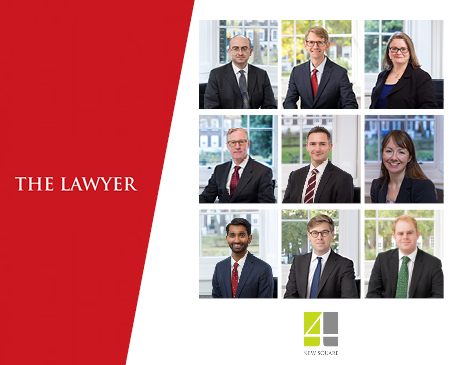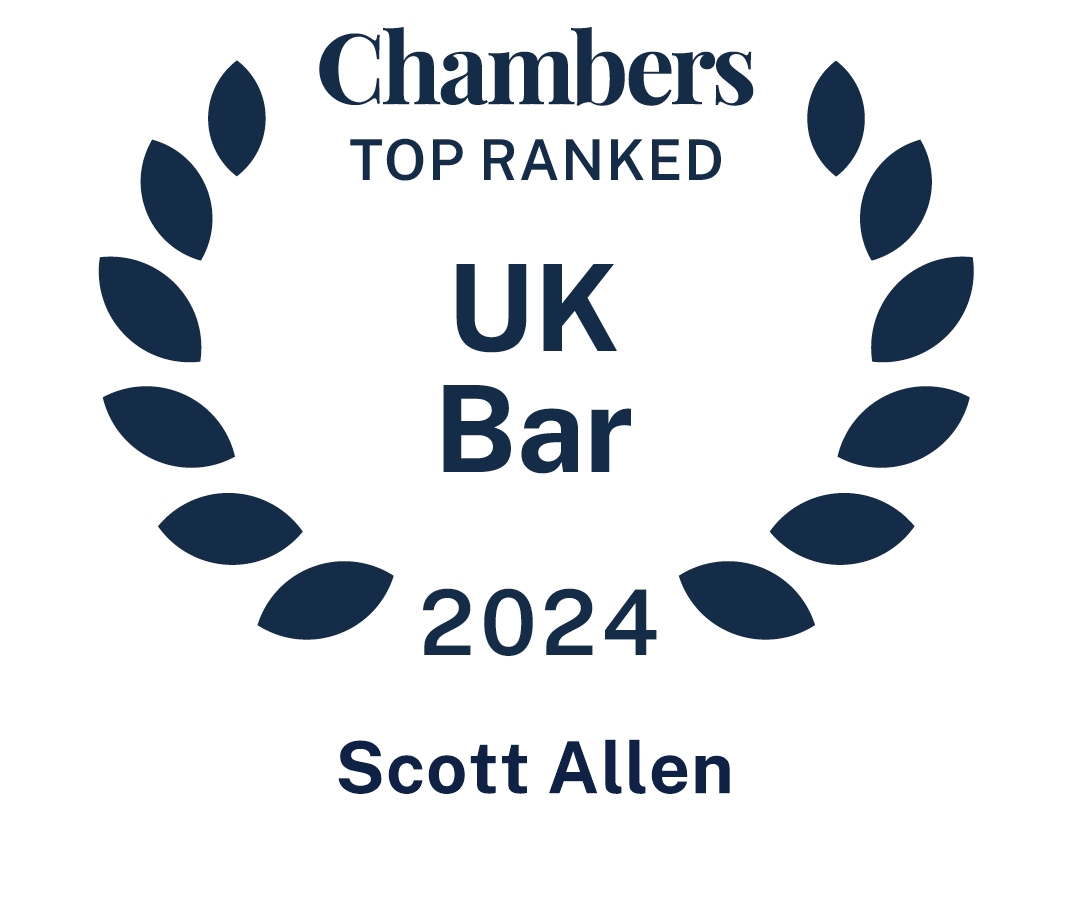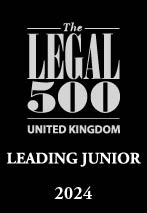
Call 2000
Chambers & Partners
“He shows huge attention to detail and had a fantastic grip on the issues of the case, despite their complexity.”
Named ‘Professional Negligence Junior of the Year‘ (2018) by Chambers & Partners UK.
Scott Allen is a recommended junior in the Legal 500 and Chambers & Partners for professional liability claims. He is committed to providing practical, commercial advice and advocacy of the highest quality, complemented by an approachable and client-friendly service.
Scott is instructed regularly in professional liability work involving solicitors, barristers, accountants/auditors, surveyors/valuers (including rights to light surveyors), insurance brokers, independent financial advisers, and administrative receivers, acting for claimants as well as defendants. The litigation from the last recession saw Scott develop a particular specialism in claims involving administrative receivers (e.g. Bell v Long & PKF [2008] EWHC 1273 Ch, [2008] 2 BCLC 706), as well as claims brought by lenders against solicitors and surveyors. He has also been involved in much of the litigation in respect of unsuccessful tax avoidance structures, including film finance, conditional share award, and BPR schemes. In recent years, much of his time has been spent defending solicitors and accountants in proceedings before the SDT and FRC Disciplinary Tribunal respectively. Scott is also ranked as a leading Professional Discipline and Regulatory Law junior by Legal 500.
Recognised by the directories as ‘[a] Superb all-rounder: a QC in the making. Extremely bright, hard-working and user-friendly. Gets to the heart of a case quickly and is not afraid to call a spade a spade. Master tactician. Does not get flustered. Excellent advocate – leaves no stone unturned. First-choice Senior Junior.’ (Legal 500, 2023), “A pleasure to work with and a client-friendly barrister.”, “impressive in court and has an efficient, well-considered style.” (Chambers & Partners, 2023), “a fantastic junior – hardworking, intelligent and easy to deal with” (Legal 500, 2019), “he gets it, and he gets it quickly” (Chambers & Partners, 2019). “Completely on top of absolutely everything”, “very bright, sensible and accessible” (Chambers & Partners, 2016). His “‘sharp intellect and well thought-through opinions’ have made him a junior of choice on a range of professional negligence claims” (Chambers & Partners, 2013).
Recent cases of note include, Griffith v Gourgey [2018] 3 Costs LR 605 (an important case in respect of solicitors’ warranty of authority), Hughes-Holland v BPE [2018] AC 599 (with Roger Stewart KC – the most important professional negligence case since SAAMCO), Williams v SRA [2017] EWHC 1478 (with Patrick Lawrence KC, an important disciplinary case in the Divisional Court in which a solicitor’s dishonesty conviction was overturned),Herring v Shorts Financial Services LLP [2016] W.T.L.R. 1203 (in which Scott successfully resisted the extension of White v Jones liability to financial advisors assisting with a Will), and appearances in the Court of Appeal for solicitors in Clydesdale Bank Plc v Workman [2016] P.N.L.R. 18 (with Roger Stewart KC) and Newcastle International Airport v Eversheds LLP [2014] 1 WLR 3073 (with Ben Patten KC).
He appeared with Roger Stewart KC in the Supreme Court in BPE Solicitors v Hughes-Holland [2017] UKSC 21, in which the Supreme Court provided clarification of the extent to which the SAAMCO principle is to be applied to solicitors and other professionals. The court restated and provided further explanation of the SAAMCO principle, including distinction between the provision of “information” and “advice”. It overruled a series of cases which had been the source of much confusion about how the principle was to be applied to cases involving solicitors. Click here to read an article looking at the implications of the case’s decision, written by Roger Stewart KC and Scott Allen.
In addition to his professional indemnity work, in which he is often instructed for insurers, Scott is also instructed in subrogated recovery actions and specialist insurance disputes including policy wording/coverage issues and allegedly fraudulent insurance claims.
As well as his disciplinary work in the Solicitors Disciplinary Tribunal and FRC Disciplinary Tribunal, he has also advised or appeared in proceedings involving the Council of Licensed Conveyancers Disciplinary Committee and the Chartered Institute of Public Finance and Accountancy. Scott has also been able to combine his work with his love of all things involving sport, and to represent the Motor Sports Association successfully in Motor Sports Council Investigatory Tribunal proceedings against Mitsubishi Motors UK.
Scott advises and appears in construction disputes (including Party Wall Act proceedings), appearing frequently in the Technology and Construction Court in construction litigation (e.g. Bromley LBC v Heckel [2015] EWHC 3606 (TCC)), as well as advising and appearing in arbitration and adjudication of construction disputes.
Scott also has a considerable Chancery-based practice involving partnership disputes, international trust disputes (Cayman Islands), declarations of beneficial interest in property, general banking and mortgage work, and applications under the Trusts of Land and Appointment of Trustees Act 1996.
A major part of Scott’s practice is general commercial litigation, with a particular focus on telecommunications and information technology disputes. Scott frequently appears for telecommunications providers, and previous cases include a multi-million pound recovery action involving a wavelength capacity agreement and indefeasible rights of use. Scott has undertaken some energy work, and appeared successfully in a major commercial court trial (Dalkia v Cetech [2006] 1 Lloyd’s Rep 599) involving a complex contractual dispute in relation to an electricity generating turbine. Scott has also advised on a number of commercial agency cases dealing with issues of actual and ostensible authority, and the ‘effective cause’ requirement in respect of an agent’s entitlement to success-based commission fees.
Scott’s commercial work has seen him advise on pre-action and third-party disclosure applications, and successfully obtain orders pursuant to the Norwich Pharmacal jurisdiction against third parties.
Click here for a Privacy Policy for Scott Allen.
Scott is instructed to advise upon and appear in commercial arbitrations, arbitrations arising from construction contracts, as well as paper arbitrations in insurance coverage disputes.
Scott is instructed in a variety of Chancery matters, including partnership disputes, declarations of beneficial interest in property and Chancery related professional negligence matters including solicitor’s conveyancing negligence cases, negligent tax advice, negligence in respect of Wills (see the case of Herring v Shorts Financial Services LLP [2016] W.T.L.R. 1203) and the undue influence allegations raised in cases such as RBS v. Etridge (No 2). He was instructed to represent a multi-national bank in relation to recovery proceedings against a trustee company pursuant to the terms of a Sale and Purchase Agreement, and acted successfully for the bank at trial in Bicester Properties Ltd v West Bromwich Commercial Ltd (earlier successful strike out of a number of the allegations reported at [2012] 10 WLUK 301). Scott is routinely instructed by banks and building societies in relation to the gamut of claims arising from mortgage lending, and has lectured several times on the issues arising from such claims. Scott has also been instructed to advise in relation to international trust disputes (Cayman Islands).
Commercial contractual disputes form a major and burgeoning part of Scott’s practice. Scott particularly enjoys his involvement in commercial disputes, and believes that his pragmatic approach and tactical awareness lends itself particularly well to the priorities and client sensitivities of commercial litigation. He is also instructed in commercial arbitration and sees this as a key area of his practice, especially in relation to arbitration involving foreign corporations.
Scott has been involved in disputes involving computer games, dentists’ partnership agreements, recruitment agreements for large bakeries, telecommunications disputes, cost saving facilitators’ agreements, an energy turbine financing and servicing agreement, fleet maintenance agreements, lost profit claims in the nightclub industry, breach of contract in the adult film and services sector, motor sport regulation, foreign currency loan accounts, the interpretation and effect of a staged contract for the provision of landfill materials; the interpretation and effect of truck drivers’ franchise agreements; the interpretation and effect of ‘discretionary’ bonus clauses in banker’s remuneration packages; the interpretation and effect of a computer game marketing distribution and sale agreement, and the entitlement of commercial agents to commission in loan finance transactions,. He is regularly instructed to appear in the Commercial Court and in commercial arbitrations, and appeared (with Ben Hubble QC) for the successful claimant in the Commercial Court case of Amalgamated Metal Corporation Plc v Wragge & Co [2011] EWHC 887 (Comm).
Scott was also retained (with Michael Soole QC, as he then was) for the successful Defendant in the case of Dalkia v Celtech [2006] 1 Lloyd’s Rep 599 in which virtually the gamut of English contractual law was debated. Key issues in that case involved the meaning of ‘material breach’ in a termination clause, the principles upon which the court could interfere with the drafting of a commercial contract to remedy an ‘obvious mistake’ by the parties, even where that involved substantial consequential amendment to several clauses, and the application of the rule against penalties to an accelerated payment clause upon termination of an energy services agreement.
Scott has advised in international commercial disputes and was involved in preparing a fascinating fraud trial in Belize involving a medical school.
“Incredibly robust, great on his feet and his quality of written work is excellent. A great technician.” – Chambers & Partners
“A quick thinker on his feet, and he is able to read the court well.” – Legal 500
“Keen to fight hard for the client, experienced with accountants’ disciplinary matters, and engaging to work with.” – Legal 500
“Very personable with a meticulous eye for detail.” – Legal 500
“A fantastic junior – hardworking, intelligent and easy to deal with.” – Legal 500
Disciplinary work forms a major part of Scott’s practice.
Scott appeared for one of the respondents to the FRC complaint against KPMG and various of its employees relating to the AQR review of the 2016 Carillion audit. This trial, which was rated by The Lawyer as one of the top 20 trials of 2022, was the subject of intense media and industry scrutiny, and Scott’s appearance within it, defending allegations against his client of dishonesty and lack of integrity, cements his reputation as a leader in the field of disciplinary practice.
The case of Williams v SRA [2017] EWHC 1478, in which Scott was retained with Patrick Lawrence QC, was an important decision of the Divisional Court in which Scott and Patrick succeeded in having a solicitor’s dishonesty conviction overturned, and in which the court gave guidance upon how cross-examination should be conducted in respect of allegations of dishonesty (the rule in Browne v Dunn) and the relationship between a lack of integrity and dishonesty. The part of this case dealing with sanction was also an important decision, in which Scott also appeared with Patrick Lawrence QC, and is reported at [2017] EWHC 2005.
Scott was instructed (with Ben Hubble QC) for Mazars in the prosecution brought against them in 2013 in respect of pension scheme advice. He is instructed to defend solicitors in the SDT in respect of allegations ranging from breach of Rule 14.5 of the SRA Accounts Rules 2011 (prohibition of the provision of banking facilities from a solicitor’s client account), to allegations of serious dishonesty, and has a number of heavy ongoing cases in the SDT.
Scott appeared with Patrick Lawrence QC on the successful prosecution of complaints on behalf of the Accountants Joint Disciplinary Scheme against company auditors and in-house company accountants in the Kidsons case (involving improper recognition of revenue from conditional contracts), and
Scott has also appeared before the Council of Licensed Conveyancers’ Disciplinary committee and has been instructed to prosecute serious complaints on behalf of the Chartered Institute of Public Finance and Accountancy, involving public authority leasing arrangements, NHS trust financial management and local council financial improprieties.
In the world of sport, Scott represented the Motor Sports Association in Motor Sports Council Investigatory Tribunal proceedings against Mitsubishi Motors UK. The issues in that case were the use of a non-homologated part by MMUK in the Yorkshire Rally, enabling their driver to win the national rally championship, and the evidence given by MMUK in the MSA National Court proceedings which followed. As a result of Scott’s cross-examination in the Investigatory Tribunal proceedings, it was found that MMUK had for a number of years put competitive advantage above the safety of competitors and spectators, and had not taken sufficient steps to put into effect the recommendations of the National Court.
Scott is a member of the Association of Regulatory and Disciplinary Lawyers.
Scott frequently advises in relation to issues arising on insurance policies, as well as in respect of insurance disputes. He was heavily involved in the subrogated recovery by insurers of payments made in relation to the Buncefield oil refinery explosion, and has advised on numerous aspects of motor insurance law.
Scott was retained to advise on a number of the insurance aspects arising from the Shoreham air tragedy, and had a significant involvement for a number of years in the film contingent expense insurance litigation.
As with his professional liability work, whilst the majority of Scott’s work is for insurers, he has been instructed by claimants in a number of disputes where insurers have refused to pay after fire damage, flood damage, and other insured perils.
Scott has advised on the coverage effect of policy wording in relation to professional indemnity and general insurance policies, in particular in relation to the provisions which deal with when a claim is first made and which of several potential insurance policies respond to the claim in question. He has also advised in several cases on the construction of Legal Expenses Insurance policies, and successfully resisted claims against LEI insurers where policy coverage has been declined.
Scott has advised in several cases where fraud allegations have been made, as well as successfully defending a number of claims where theft losses have been wrongly inflated. He also advised upon issues arising from claims made by one co-insured against another, in partnerships as well as within companies, and the effect of fraud upon such claims.
Scott is also instructed regularly in relation to claims which are covered by Directors and Officers insurance policies, as well as claims against insurance brokers.
“You know he will always fight your client’s corner. Even with the most technical advice, he presents it in a clear and user-friendly manner.” – Chambers & Partners
“A fighter.” – Legal 500
“A pleasure to work with and a client-friendly barrister.” “He’s impressive in court and has an efficient, well-considered style.” – Chambers & Partners
“Superb all-rounder: a QC in the making. Extremely bright, hard-working and user-friendly. Gets to the heart of a case quickly and is not afraid to call a spade a spade. Master tactician. Does not get flustered. Excellent advocate – leaves no stone unturned. First-choice Senior Junior.” – Legal 500
“A highly competent, hard-working and effective barrister.” “He’s great on the more complex cases. He drafts brilliant pleadings, he is great in conference, and he’s adaptable.” “He’s particularly clued up when there are regulatory issues involved in the negligence work.” – Chambers & Partners
“Scott has a commercial focus, drive for perfection, and clarity of thought that is welcomed by solicitors and commercial clients. Top of his league.” –Legal 500
“He never disappoints: he is fantastic in communicating and keeps us updated. He is a rare breed in that he is good at putting people at ease if they are a bit nervous.” “He is tenacious and determined. He works as a team with us, is easy to deal with, and is great on his feet as well.” – Chambers & Partners
“Very friendly, professional and approachable.” – Legal 500
Named ‘Professional Negligence Junior of the Year’ (2018) by Chambers & Partners UK.
Scott is instructed in all areas of professional liability work. He has a wealth of experience in claims against solicitors, barristers, auditors, accountants, valuers, surveyors, architects, construction professionals, recruitment professionals, insurance brokers, independent financial advisors and administrative receivers. He is recommended by the Legal 500 and Chambers and Partners in the sphere of professional liability work.
A core part of Scott’s practice is solicitors’ negligence work, and he appeared (with Roger Stewart QC) in the Supreme Court in BPE Solicitors v Hughes-Holland [2017] UKSC 21, the most important case in the entire professional negligence field since SAAMCO itself, in which the Supreme Court provided clarification of the extent to which the SAAMCO principle is to be applied to solicitors and other professionals. The court restated and provided further explanation of the SAAMCO principle, including distinction between the provision of “information” and “advice”. It overruled a series of cases which had been the source of much confusion about how the principle was to be applied to cases involving solicitors.
Scott has appeared in solicitors’ negligence cases throughout the entire range of solicitors’ work, from matrimonial proceedings, to complex tax advice, and everything in between.Scott has extensive experience in claims involving tax avoidance structures, including numerous pieces of litigation involving film finance schemes, as well as other schemes such as conditional share award structures and corresponding deficiency relief on life assurance policies. Scott has acted for claimant investors, as well as defendant IFAs, solicitors, accountants and tax advisers, in what is a particularly strong and well-developed area of his practice.
Scott successfully defended administrative receivers in the case of Bell v Long & PKF [2008] EWHC 1273 Ch, [2008] 2 BCLC 706, [2008] BPIR 1211; [2008] 25 EG 172 (C.S.), in which an important and widely reported judgment was given by Patten J. about the duties of receivers and the timing and method of sale of property portfolios. He is routinely instructed in respect of cases involving the appointment of LPA and administrative receivers.
Scott successfully defended financial advisers in Herring v Shorts Financial Services LLP [2016] W.T.L.R. 1203 (resisting the extension of White v Jones liability to financial advisors assisting with a Will), and solicitors in Newcastle International Airport v Eversheds LLP [2014] 1 WLR 3073 (with Ben Patten QC). He appeared with Roger Stewart QC in the Court of Appeal for solicitors in Clydesdale Bank Plc v Workman [2016] P.N.L.R. 18. The last economic recession saw a proliferation of lender claims against solicitors and surveyors, and Scott was heavily involved in this litigation, acting on behalf of lenders but more usually for the solicitors or the surveyors, often in cases in which multi-million pound damages claims were pursued. Such claims can also involve a breach of undertaking claim against solicitors, and Scott has extensive appearance in advising on the interpretation and method of enforcement of solicitors’ undertakings.
The representation of accountants and auditors constitutes a large part of Scott’s practice, and (in addition to his disciplinary practice) he has recently defended a big four firm of accountants in respect of advice provided in tax litigation, has been instructed in numerous cases involving negligent tax advice (including various tax avoidance schemes, and domicile advice), and was recently retained in a case in which it was alleged that payments to an Employee Benefit Trust should not have been recognised in a company’s accounts. Scott has advised auditors about the scope of their liability in a number of large cases, and is one of the ‘go to’ counsel for any litigation involving allegations against accountants.
A developing part of Scott’s practice is the representation of professionals involved in the provision of information technology services. Scott is an assistant editor of the current edition of Jackson & Powell on Professional Negligence and was for many years the co-author of the chapter on IT Professionals; in the 8th edition of the book he is the author of the chapter on Patent Attorneys and Trade Mark Attorneys, which is another area of interest to Scott and in which he practices.
Claims against accountants and auditors forms a fundamental part of Scott’s professional indemnity practice. His many disciplinary cases involving the profession have enabled him to have a deep-rooted understanding of the issues faced by accountants in their working lives, and he brings this expertise to the wealth of litigated cases in which he has been instructed, involving issues including:
Scott was recently instructed by a big four accountancy firm to defend a claim involving advice given in film finance tax litigation, and has an intimate knowledge of a number of the film finance schemes, having defended various professionals involved in the establishment and promotion of such schemes. He also successfully obtained an order in the High Court that a case against accountants be summarily dismissed, in the case of Murfin v Ford Campbell [2011] EWHC 1475 (Ch).
Scott enjoys the technical challenge of familiarising himself with the relevant accounting standards, and arguing with his brother (who is a chartered accountant) about their interpretation and application.
Scott has been instructed in many cases involving construction professionals, bringing claims against (and defending) architects, contract administrators, mechanical and electrical engineers, structural engineers and numerous skilled sub-contractors.
He appears regularly in the Technology and Construction Court (including in Bromley LBC v Heckel [2015] EWHC 3606 (TCC), in which a claim against a project manager was successfully struck out) , and has a healthy following amongst solicitors specialising in construction work, both in London and in the regional centres. Scott’s ability to digest the technical aspects of heavy construction claims is valued highly by those who instruct him, and his practice in this area continues to grow.
Recent cases include claims against architects in relation to numerous defects in a West End refurbishment project, insufficient design/monitoring of piling works (structural engineers), a defective specification and testing regime for a passive cooling system (M&E engineers), defective advice about the electrical requirements of a commercial development (M&E engineers), defective design of an executive property (structural engineers), and the construction of a commercial extension over a high pressure water main (architects).
Scott receives regular instructions to represent insurance brokers, including a successful appearance in a trial involving the apportionment of liability between successive brokers where cover was not obtained in relation to burglary of a commercial premises.
Scott has also advised upon a number of cases involving defective fire damage cover, each with their own non-disclosure issues, as well as numerous cases involving allegations that adequate advice about coverage and/or disclosure issues was not provided by the insurance brokers.
Claims against insurance brokers are often linked to or arise from Scott’s practice in relation to coverage advice, and he is a respected port of call whenever a claim against an insurance broker is contemplated.
Claims against insurance brokers are often linked to or arise from Scott’s practice in relation to coverage advice, and he is a respected port of call whenever a claim against an insurance broker is contemplated.
Scott has been instructed in a number of cases involving the advice provided by financial services professionals. These have involved a range of investments and issues, including:
A recent trial in this area involved the successful defence of an IFA who provided information to a client which was used, incorrectly, by a solicitor, when drafting the client’s Will. Scott resisted the extension of White v Jones liability to IFA’s in this situation, and the claim was dismissed – Herring v Shorts Financial Services LLP [2016] W.T.L.R. 1203.
Scott has a wealth of experience in claims against solicitors and barristers, covering the vast range of work (both litigious and non-litigious) which lawyers undertake. Claims in which Scott has been instructed, involving claims against solicitors, include:
Scott has brought successful claims against barristers and has also defended successfully senior members of that profession. He ranks claims against lawyers as one of his core areas of specialism and it is an area of his practice that he particularly enjoys. Cases of note include:
Scott has very extensive experience of claims involving surveyors and valuers. He has represented surveyors in a number of cases involving multi-million pound claims and the valuation of large mixed use developments, as well as smaller residential developments and single property valuations (including the largest private property loan ever made by a well-known private bank, in relation to a luxury property in Monaco). He has advised upon the whole range of issues in this area of law including
Claims against surveyors and valuers form a large part of Scott’s practice and the post 2008 economic climate saw this area of his core work grow significantly.
Scott represented the Motor Sports Association in Motor Sports Council Investigatory Tribunal proceedings against Mitsubishi Motors UK. The issues in that case were the use of a non-homologated part by MMUK in the Yorkshire Rally, enabling their driver to win the national rally championship, and the evidence given by MMUK in the MSA National Court proceedings which followed. As a result of Scott’s cross-examination in the Investigatory Tribunal proceedings, it was found that MMUK had for a number of years put competitive advantage above the safety of competitors and spectators, and had not taken sufficient steps to put into effect the recommendations of the National Court. Scott has also advised the Motor Sports Association in relation to various aspects of its insurance arrangements and terms and conditions with its members.
Scott has also advised in a number of solicitors’ negligence cases where sports law is the background subject matter, most particularly in respect of contractual and other disputes in a football context. Scott is a life-long sports fan and relishes the chance to combine business with pleasure when advising on sports law cases. His experience in other disciplinary work makes him an ideal candidate for sports disciplinary work, and his commercial law experience makes him very well suited to contractual and other commercial disputes within a sporting context.
Mediation is a core part of Scott’s practice. He completed his training course as a mediator with the prestigious London School of Mediation and is committed to helping as many people as he can to settle their disputes without resort to the courts. He brings a fresh and innovative approach to his mediations, encouraging the participants to think differently about what the mediation process entails and how they can best deploy the time available to them to bridge the differences between them. Scott believes that the mediation process begins well before the day itself, and works with participants in advance to kick-start the mode of thinking which can lead most directly to resolution rather than confrontation. His view is that mediation does not have to follow the same formula in every case, and tries to foster flexibility and creativity in reaching the common goal of a negotiated settlement.
Scott enjoys acting as mediator more than any other part of his practice at the Bar, bringing enthusiasm and dynamism to the resolution of disputes, and welcomes the opportunity to assist that process in any case, no matter how big or small.
Scott has appeared as an advocate in very many mediations during his career and is careful to encourage positive dispute resolution at all times, as counsel in the case, rather than impede it. He has a very good track record of achieving settlements which are satisfactory to his clients, and believes that his measured and fair approach as an advocate has contributed to the resolution of many seemingly intractable disputes.

On Friday, 22nd March 2024, HHJ Cawson KC sitting as a Deputy…

The Lawyer has published their list of the Top 20 Cases of…



Chambers & Partners“He shows huge attention to detail and had a fantastic grip on the issues of the case, despite their complexity.”
Chambers & Partners“Very bright, but equally commercial and pragmatic. He's also very user-friendly.”
Legal 500“He is respected by other lawyers in the area and well-liked by clients.”
B.A. (Oxon.)
Member of COMBAR and ARDL
4 New Square
Lincoln's Inn
London, WC2A 3RJ
BARRISTERS REGULATED BY
THE BAR STANDARDS BOARD
Accessibility | Cookies | Disclaimer | Equality & Diversity | Privacy Policy | © 4 New Square Chambers – All Rights Reserved | Site by Tela.
| Cookie | Duration | Description |
|---|---|---|
| cookielawinfo-checkbox-advertisement | 1 year | Set by the GDPR Cookie Consent plugin, this cookie is used to record the user consent for the cookies in the "Advertisement" category . |
| cookielawinfo-checkbox-analytics | 11 months | This cookie is set by GDPR Cookie Consent plugin. The cookie is used to store the user consent for the cookies in the category "Analytics". |
| cookielawinfo-checkbox-functional | 11 months | The cookie is set by GDPR cookie consent to record the user consent for the cookies in the category "Functional". |
| cookielawinfo-checkbox-necessary | 11 months | This cookie is set by GDPR Cookie Consent plugin. The cookies is used to store the user consent for the cookies in the category "Necessary". |
| cookielawinfo-checkbox-others | 11 months | This cookie is set by GDPR Cookie Consent plugin. The cookie is used to store the user consent for the cookies in the category "Other. |
| cookielawinfo-checkbox-performance | 11 months | This cookie is set by GDPR Cookie Consent plugin. The cookie is used to store the user consent for the cookies in the category "Performance". |
| CookieLawInfoConsent | 1 year | Records the default button state of the corresponding category & the status of CCPA. It works only in coordination with the primary cookie. |
| viewed_cookie_policy | 11 months | The cookie is set by the GDPR Cookie Consent plugin and is used to store whether or not user has consented to the use of cookies. It does not store any personal data. |
| Cookie | Duration | Description |
|---|---|---|
| wp_law_pdfbuilder_bespoke | 1 Year | Used for the portfolio builder |
| wp_law_pdfbuilder_list | 1 Year | Used for the portfolio builder |
| Cookie | Duration | Description |
|---|---|---|
| _ga | 2 years | The _ga cookie, installed by Google Analytics, calculates visitor, session and campaign data and also keeps track of site usage for the site's analytics report. The cookie stores information anonymously and assigns a randomly generated number to recognize unique visitors. |
| _ga_DJZVZPQ3PF | 2 years | This cookie is installed by Google Analytics. |
| _gat_gtag_UA_196640177_1 | 1 minute | Set by Google to distinguish users. |
| _gid | 1 day | Installed by Google Analytics, _gid cookie stores information on how visitors use a website, while also creating an analytics report of the website's performance. Some of the data that are collected include the number of visitors, their source, and the pages they visit anonymously. |
Select the expertise that you would like to download or add to the portfolio
| Title | Type | CV |
|---|
Click here to share this shortlist.
(It will expire after 30 days.)
Need more information about the above People and Expertise?
Talk to one of our clerks: +44 (0)20 7822 2000
